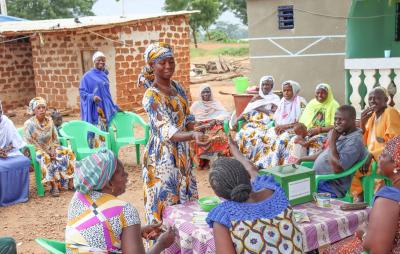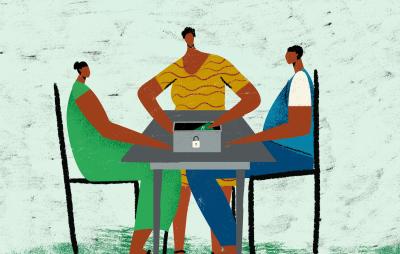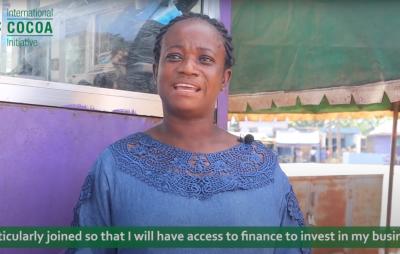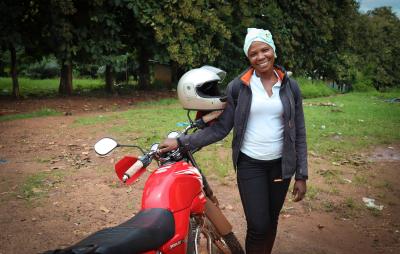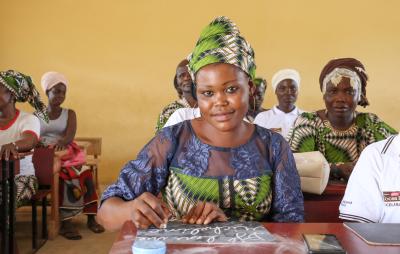Promoting gender equality is crucial to tackling child labour and increasing child protection.
When women and men enjoy equal rights, everybody benefits. Girls and boys are more likely to attend and stay in school and less likely to be involved in child labour.

Advancing women's economic empowerment, encouraging their participation in household decision-making, and involving them in systems that aim to tackle child labour all contribute to increasing child protection and help reduce child labour rates.
Economic empowerment
When women are given the possibility to engage in economic activities and generate additional income, whole families can be lifted out of poverty. Additional income can also help families better deal with unforeseen events, such as cocoa pod disease or price crashes, that can put children at greater risk of becoming involved in child labour.
Supporting the development of Village Savings and Loans Associations and Income Generating Activities can contribute towards gender equality and boost household resilience.
Village Savings and Loans Associations (VSLAs) are savings groups, often targeted at women, that act as rural banks in areas where access to finance is overwise difficult or hard to come by. Members make regular contributions to a collective pool from which they can take out small loans and repay the money in time with a flat rate of interest. At the end of the year’s cycle, the group’s collective profits are then distributed to its members on a scale dependent on their contribution.
VSLAs help communities address some of the underlying issues of child labour by allowing members to cope when faced with unforeseen events, invest in alternative sources of income or finance their children’s education. Besides bringing financial benefits to women, these groups help build a strong sense of social cohesion and can empower women to become decision-makers in their households and communities.
Income-generating activities can take many forms and include small businesses, such as artisanal crafts or shops, or diversification of agricultural production, for example through rice or vegetable farming.
They provide alternative ways to earn money, in addition to cocoa production, leading to financial benefits and diversifying household incomes. This additional income is often used to finance children’s education: covering fees, schoolbooks, or uniforms.
These activities can have substantial benefits for children’s welfare, boosting their chances of receiving a quality education and helping address some of the root causes of child labour.
Participation in decision-making
While increasing women's income can have positive outcomes, it may not be enough to improve gender equality and child protection. To achieve these goals, further steps are needed to strengthen women's participation in household decision-making.
Research has shown that when women participate in household spending decision-making, they tend to prioritise the health, nutrition and education of their families. This can lead to increased school attendance and a reduced likelihood of children being involved in child labour.
Raising awareness about gender equality is key to ensuring equal participation in decision-making. This is why we often combine our Village Savings and Loans Associations and Income-generating programmes with gender equality training and couples dialogue sessions. This encourages discussions on equitable roles within households and raises awareness about the benefits of gender equality within families.
ICI has integrated these approaches in a cash-plus programme that transferred cash to women and encouraged their participation in Village Savings and Loans Associations and gender training. Learn more about the positive impact of directing cash to women and promoting joint decision-making to reduce child labour in our brief.
Literacy skills
Literacy is crucial for promoting women’s rights, enhancing livelihood skills, and ensuring gender equality. In addition, research by ICI and others shows that when women are more educated, their children are less likely to be involved in hazardous work.
Together with our partners, we’ve helped set up adult literacy and numeracy classes for women in cocoa-growing communities. Those literacy and numeracy skills can also help women manage their income-generating activities more efficiently and ask for loans from banks.
Working within CLMRS
Gender equality is also important in systems and programmes that aim to tackle child labour. Child Labour Monitoring and Remediation Systems (CLMRS) identify children in child labour and put in place effective solutions for those in need or at risk. They also allow for ongoing monitoring of every child’s situation over time. There are many roles vital to the functioning of a good CLMRS that are traditionally filled by men, such as Community Facilitators or Monitoring and Remediation Agents.
Our research and data analysis shows clear benefits to employing women, for example, as Community Facilitators, both in terms of the skills women bring to the job and the transformative impact on gender equality/dynamics in cocoa communities.
The data show that female agents have excellent communication and interpersonal skills, which are key qualifications for the job, and have an advantage over men regarding their interactions with children. This may be one reason why female Community Facilitators are significantly more likely to identify child labour cases than their male counterparts. This suggests that additional efforts to recruit and train women would improve the effectiveness of these systems.
For women, the job can be a source of empowerment as it offers an opportunity to further develop their professional and personal skills, build social capital, gain self-confidence, and acquire financial independence. Beyond that, the female agents can constitute role models for girls and women in the communities. As female agents break cultural norms and demonstrate that they are professionally competent, mobile and independent, they set powerful examples that can change gender stereotypes amongst cocoa farmers and their families.
All the activities mentioned above contribute to promoting gender equality and tackling discrimination. The overall impact extends beyond individual participants, benefiting entire households and the broader community. This can reduce the risk of children getting involved in child labour, improve educational opportunities for children, and enhance welfare for the entire family. Our data shows that combining interventions designed to help improve gender equality with awareness-raising sessions can significantly help improve their effectiveness in tackling child labour. Find out more here.

